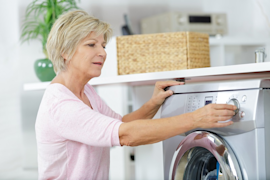- Kenmore refrigerator water filters
- Whirlpool refrigerator water filters
- Samsung refrigerator water filters
- GE refrigerator water filters
- LG refrigerator water filters
- Frigidaire refrigerator water filters
- KitchenAid refrigerator water filters
- Maytag refrigerator water filters
- Kenmore Elite refrigerator water filters
- Estate refrigerator water filters
- GE Profile refrigerator water filters
- Amana refrigerator water filters
- Bosch refrigerator water filters
- Dacor refrigerator water filters
- Electrolux refrigerator water filters
Kenmore 796 model top-load washer error codes

These error code explanations can help you diagnose a problem with your Kenmore or Kenmore Elite top-load washer with a model number that starts with 796. Kenmore and Kenmore Elite top-load washer error codes appear on the display when the control detects a component problem. Find advice on what to check and which parts you may need to replace when an error code appears by using the chart below.
Once you determine the parts you need to fix the washer, search for your model number to find a complete list of replacement parts for your Kenmore or Kenmore Elite top-load washer.
For repair how-to help, visit the PartsDirect repair help section, which includes repair help for washing machines, other major appliances, lawn and garden equipment, garage door openers, vacuum cleaners and more.
Error Code
Condition
DIY advice
IE
Washer fills slowly
Check/Repair
Check the water supply faucets behind the washer to make , sure that they are fully open. Check the fill hoses for kinks or freezing (in winter). Check the screens on the water inlet valves for debris or deposits. Replace the water inlet valve assembly if the water inlet screens are clogged.,
Possible parts
Water inlet valve assembly
dE
Lid not closed
Check/Repair
If the lid is closed and this message appears when you start the cycle, unplug the washer and check the wire harness connection on the lid lock/switch assembly. If the wiring connections are sound, the lid lock/switch assembly usually needs to be replaced.
Possible parts
Lid lock/switch assembly
dL
Lid lock failure
Check/Repair
Check for debris in the lid lock assembly that could prevent the lock mechanism from engaging. Unplug the washer and check the wiring connections on the lid lock/switch assembly. If you find no wiring problems, you usually need to replace the door lock/switch assembly.
Possible parts
Lid lock/switch assembly
FE
Water level too high
Check/Repair
The washer is usually fills continuously because a water valve failed when this code appears. Unplug the washer and shut off the water supply. The water inlet valve assembly usually needs to be replaced to fix this problem.
Possible parts
Water inlet valve assembly
E6
Clutch error
Check/Repair
The control detects a problem with the clutch motor. Unplug the washer. Check the wiring harness connections between the main electronic control board and the clutch motor. If the wiring connections are sound, the clutch motor or the main electronic control board usually needs to be replaced.
Possible parts
Clutch motor, Main electronic control board
uE
Load is out of balance or too small
Check/Repair
If a small load is in the washer, add a few towels or garments to the load. If the load is a normal size, then redistribute the load and see if the washer spins. If the washer tub moves and bangs violently during the spin cycle, one or more of the suspension rod/spring assemblies may need to be replaced. Unplug the washer and examine those components.
How-to help
Possible parts
Suspension rod/spring assembly
UE
Load is out of balance or too small
Check/Repair
If a small load is in the washer, add a few towels or garments to the load. If the load is a normal size, then redistribute the load and see if the washer spins. If the washer tub moves and bangs violently during the spin cycle, one or more of the suspension rod/spring assemblies may need to be replaced. Unplug the washer and examine those components.
How-to help
Possible parts
Suspension rod/spring assembly
tE
Thermistor error
Check/Repair
Unplug the washer and check the wiring between the control board and the thermistor (temperature sensor). If the wiring is sound, measure the resistance of the thermistor. It should read between 80,000 to 90,000 ohms) at room temperature. If the thermistor is defective, replace it. If resistance of the thermistor is normal through the circuit, replace the main electronic control board.
Possible parts
Thermistor, Main electronic control board
PE
Water level sensor failure
Check/Repair
Unplug the washer and check the wire harness connections between the water level sensor and the electronic control board. Reconnect any loose wires or replace the wire harness if damaged. If the wire connections are okay, replace the water level sensor.
Possible parts
Water level sensor, wire harness
LE
Drive motor thermal overload tripped
Check/Repair
A failed drive motor or a restriction in the drive system of the washer causes this code. Unplug the washer. See if the basket spins freely. If not, examine and repair the cause of the restriction in the drive system. If the basket spins freely, check the wiring connections between the drive motor and the control board. Check the resistance through the drive motor windings. The winding should measure between 5 and 15 ohms. If the motor is defective, replace it.
Possible parts
Drive motor, Drive system components
Most common symptoms to help you fix your washers
Choose a symptom to see related washer repairs.
Main causes: clogged drain hose, house drain clogged, bad drain pump, water-level pressure switch failure, bad control b…
Main causes: worn agitator dogs, bad clutch, broken motor coupler, shifter assembly failure, broken door lock, suspensio…
Main causes: bad lid switch or door lock, bad timer or electronic control board, wiring failure, bad water inlet valve a…
Main causes: broken lid switch or lid lock, bad pressure switch, broken shifter assembly, faulty control system…
Main causes: unbalanced load, loose spanner nut, worn drive block, broken shock absorber or suspension spring, debris in…
Main causes: no water supply, bad water valves, water-level pressure switch failure, control system failure, bad door lo…
Main causes: lack of electrical power, wiring failure, bad power cord, electronic control board failure, bad user interf…
Main causes: leaky water inlet valve, faulty water-level pressure switch, bad electronic control board…
Main causes: water heater failure, bad water temperature switch, faulty control board, bad water valve, faulty water tem…
Most common repair guides to help fix your washers
Effective articles & videos to help repair your washers
Use the advice and tips in these articles and videos to get the most out of your washer.

We've put together some tips on keeping your washing working well.…

Find tips for using your washing machine efficiently to save energy and help reduce utility bills.…

Learn about all the convenient features on our Sears PartsDirect website that make your parts purchases easier.…